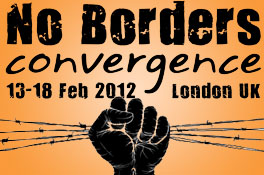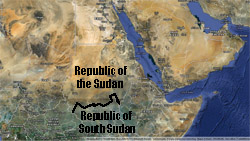SOUTH SUDAN: INDEPENDENCE AND DEATH
oil and the myth of ethnic conflict in sudan
120,000 people have been made refugees and an estimated 2 to 3000 have been killed in the worlds' newest nation, South Sudan. In the Pibor region, Jonglei State, on the Sudan/South Sudan border, clinics have been deliberately targeted and thousands of cattle farmers have had their animals killed. The UN has contingency plans for another sixty thousand more refugees. Yesterday (24th) planes bombed a refugee camp. According to media reports these latest killings started three weeks ago when the Lou Nuer tribe attacked Pibor county, which is home to the Murle tribe, ushering in another round of intra-tribal warfare.
Intra-tribal warfare doesn’t begin to explain much though. For starters, none of the 'tribes' have bomber planes. The government of (northern) Sudan does however, and it is Khartoum's leaders (headed by wanted war-criminal Omar Bashir) that the South are blaming for the attack on the refugee camp and the general of violence in the border region.
Following South Sudan's mutually agreed independence last July, it appears that the various (and poorly defined) 'tribes' in the border area are being used as as pawns in a North-South power struggle that has continued long after the formal end of hostilities in 2005.
On the northern side of the border, fighters from the Sudan People's Liberation Movement-North (SPLM-N) began fighting with (northern) government forces in June, before South Sudan became independent a month later. The fighting forced around 417,000 people to flee their homes and 80,000 to cross the border into South Sudan, and into camps such as Elfoj. The government of South Sudan- the South Sudan Liberation Movement, denies it has anything to do with the South Sudan Liberation Movement-North. It doesn't do this very convincingly though.
Drill far enough under the surface of any conflict and there is a good chance you will find oil, and Sudan is no exception. Southern Sudan has large oil reserves (the third largest in Africa) which under Khartoum flowed north to be refined and exported. This supposedly is still the deal, but the two semi-hostile powers are both hostages to fortune- landlocked South Sudan has no other obvious export route but has most of the oil. Under the peace deal, oil revenues were to be split between the two parties. Unsurprisingly given their history (the longest civil war in Africa), that deal looks to be in danger of collapse. The north has been accused of using stealing over $800 million worth of oil, and there is a dangerous escalation taking place in the region.
Neither government is likely to lose much sleep over sacrificing thousands of lives in a proxy war between tribal groups, and the border between the two countries is not only as arbitrary as any other in Africa, but it is very poorly demarcated. With so much as stake, and two ruthless states facing off over an ill-defined border zone, the situation is utterly desperate. It is no comfort to know that in the past things have gotten much worse in Sudan- taken together the First and Second Sudanese Civil Wars (1955-1972 and 1983-2005) are estimated to have killed around 1.5 to 2.5 million people.
The violence in Sudan is not helped by a near total silence by the world's media- the conflict is either too distant from Western interests or else simply too complicated for them to be bothered with more images of dead black Africans. 'Ethnic conflict' is all too often blamed on the lack of a state monopoly on violence, yet it is the violence of states that is the cause of such massive suffering- in the two Sudans as it is across the rest of the globe.
Israeli forces have begun a massive terror campaign against the Gaza Strip
Robot wars in Afghanistan are set to increase when the Ministry of Defence unveils it's new five armed Reaper drones...
Azhar Ahmed convicted for criticising the occupation of Afghanistan on social media.
As the optimism of the Arab Spring has turned into a nightmare in Syria, SchNEWS takes a belated look at the Syrian Uprising and some of the regional players whose involvement have made the conflict so bloody and so hard to understand.
Anti-militarists Smash EDO take the drone war to the arms dealers
OK, technically it's not quite summer yet, but Smash EDO kick of the Summer of Resistance with a bad music demo
Long-term Brighton anti-war direct action campaigners Smash EDO are gearing up for the start of the long awaited Summer of Resistance this coming week.
Coup and secession in Mali are the unintended consequences of NATO's regime change in Libya
Tweets by @SchNEWS








